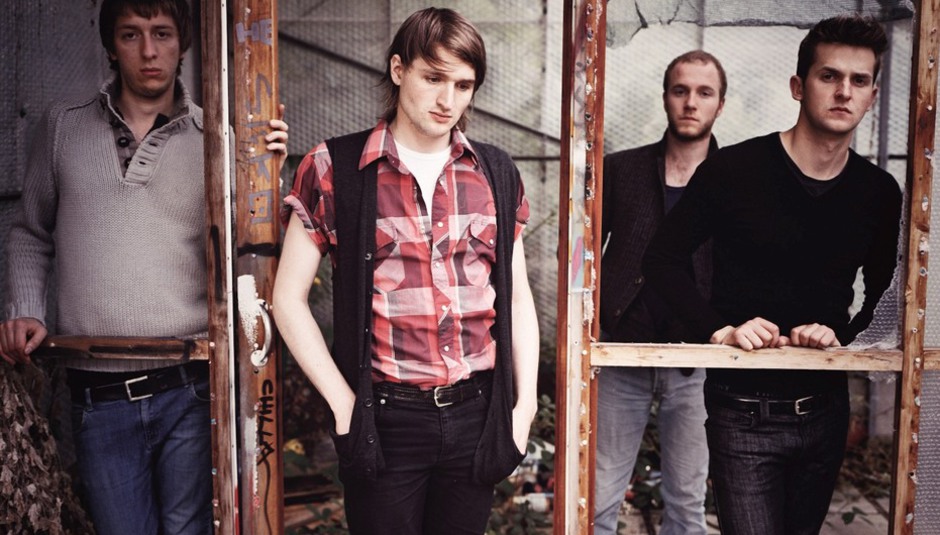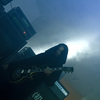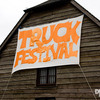With their second album, Two Dancers (reviewed here), hitting shelves today, DiS thought it about time we caught up with Wild Beasts.
DiS (Luke Slater): So, how's it going?
Tom Fleming: Not bad, thank you.
DiS: I guess you're well and truly into festival season. How have they been going?
TF: Going good, yeah. We're kind of a few steps up this year, playing bigger stages. Yeah, it's kind of been an education doing new stuff because we've had to incorporate new equipment into the show and that sort of thing so it's kind of “let's go and do this” and be a bit calmer this time.
DiS: Have you been playing all of the new stuff live this summer?
TF: No, it's only been bits and pieces. We toured a lot of it in February before it was released and when we'd just come out of the studio. But at the moment it's just kinda choice cuts, because at festivals you need the battle mentality. You have to do the hits, so to speak.
DiS: How has the reception been to the new material?
TF: It's been really good, really pleasing actually...
DiS: I remember seeing you last April in Bedford with about 30 other people, which was disappointing, but a good gig nonetheless. I think that was before the first album was released...has this sort of thing disappeared now?
TF: I think so, yeah. We haven't become a big deal overnight but I'd like to say they're behind us. It will happen again in some countries some days. We felt awful about that gig [Bedford] because we were treated really well and we had high hopes and it just didn't really happen.
DiS: The sound for Two Dancers, I think, is a lot more refined than Limbo, Panto was this a conscious decision or did it happen naturally as the songwriting process went along?
TF: It kind of happened naturally. We recorded on tape which immediately had a very different sound. Limbo, Panto was much more of a production, believe it or not, and this was the one where it was a bit more slapdash. Last time we were made to do 40 takes to get it right and edit it down so it was flawless. But this time we were working with tapes - we had four tapes, so we'd pick one of those and if we didn't play it right first time then we had to wipe all of them and do it again. It was a much more efficient way of recording in many ways. And we also stopped being scared of things like synth pads and delays, and they're a very important part of the album's sound.
DiS: What was the time scale for the recording? It sounds like an awful lot of work has gone into making it near-perfect.
TF: We had about half of the albums songs a month before we went in, and then we wrote the rest in a month then recorded for three weeks straight through. Then it was mixed for about a week...it wasn't a garage recording but it wasn't a meticulous recording either. We just had to trust our instincts a bit.
DiS: To me it sounds like it's more sleek, so it's interesting you say that...
TF: Yeah, it's a happy accident really...we thought we'd go in and make something quite raw...we didn't mean to, but it came out sounding quite smooth. To me it sounds quite kinda blurred and it's quite cool. I think it was just a case of trusting our instincts, we didn't really worry about “what if it isn't right?” because we didn't have the luxury of time to do that.
DiS: Is it something you wouldn't have attempted before the first album, now you've had a decent reception? Did it give you a bit more confidence for you to trust your instincts?
TF: It wasn't really about the reception of Limbo, Panto because we were already aware that we wanted to do something to extend that, but it was definitely a confidence thing. We got better as a band and we're better players and writers and that sort of thing. We needed to give ourselves a good talking to, saying “can you sing, can you play, can you write?” and y'know, if you can't you're gonna fail. So you did have to talk to yourself.
DiS: What is the process like now for writing songs? Do you write your own vocal melodies?
TF: It tends to be like that, yeah, it's not set in stone by any means but it does tend to be like that. If the songs are written quickly it'll be that either Hayden or I will come up with an idea and that will form the core. The processes on this record were a lot more fluid, there was quite a few jamming sessions which we did record...there was only one demo which was about three songs and then we took it from there, there's a lot of siphoning in and out of stuff. I mean, we were working on stuff, there was nothing set in stone and we let ourselves experiment but were directed – we knew what we wanted to achieve but we were a bit more open about how we wanted to get there.
DiS: How old are the songs on Two Dancers? You often get a band who has 3-4 year's worth of songs for their first album, and then following up within a year, it's quite a close sort of thing.
TF: We started writing songs as soon as we came back from Sweden last January. Probably 'All The King's Men' was in complete form after that and 'Underbelly' which was a full band version. After that, there was a couple more written over the year but generally speaking they were written about a month to six weeks before we went in, so very new and very current which was important to us. We thought it was a lot more contemporary, whereas Limbo, Panto sounded like an introduction to Wild Beasts and “this is what we do”, this is Wild Beasts living in the moment, reflecting on something that's happened to us musically and non musically.
DiS: How have your expectations differed from when you released Limbo, Panto last year? It got a pretty good reception critically, and there seems to be a decent amount of hype around Two Dancers...do you let that thing not go to your head too much?
TF: I'd be lying if I wasn't pleased when I said I read a good review, but you have to kind of take the view that “I know best”. It's very nice for people to like it, but there's things I would have changed and thing that maybe people have got wrong. But ultimately, as long as people are enjoying it that's wonderful, and I'm very pleased with the album which is something I don't say very much, that I'm pleased with something I've done. I've seen a couple of reviews which have been kind and I am pleased.
DiS: How's your relationship with Domino?
TF: It's good. At both ends I think we, and they, realised that we weren't going to be the pop success that we ideally wanted to be so we had a new-found freedom when we accepted that we were fairly leftfield. That gave us a greater freedom to work musically rather than in record company terms and we were much more comfortable doing that anyway. They're very supportive of what we're doing anyway and Laurence [Bell, founder of Domino] is brilliant, he's the most unassuming mogul you'll ever meet. So yeah, they've been really good to us.
DiS: In terms of you being a pop act, as you say, do you think this album is a little bit more instantly accessible than Limbo..., which seemed to be more of a grower?
TF: When we went in we thought that this was going to be a more grown-up album, that it was going to be much more dark, much more difficult, and then it came out sounding like some sort of strange singles collection and we're not really sure how this happened! But we're aware it's much more accessible and it's not really deliberate, but as we were doing it we became aware and became calmer. We made the points we'd made on Limbo ,Panto and wanted to do something that was a bit more artistic, more deliberate and more measured.
DiS: Do you think that'll affect the way you do your live shows at all?
TF: Possibly, yeah. We kind of have a lot of up moments and a lot of down moments. When we have been playing we have been positioning songs accordingly. The album has a natural flow to it with the songs and we're trying to keep shades of that live, leading one piece into the next.
DiS: How did the video shoot for 'Hooting & Howling' come about?
TF: Like any video we accepted treatments and talked about it but the reason we picked the underwater video was that we wanted abstract shots and shots of things underwater. The song itself is very abstract and very strange structurally so we didn't want to tell a story with the video, we wanted it to be about shape and tone and that sort of thing. I'll tell you, I'm a very poor swimmer and that was terrifying for me. The water was pushing 50 degrees and had very, very hot lights above you which, if you splashed about too much would shatter and you'd get covered in glass. We were weighted down, our instruments and in our pockets... I won't be rushing to do it again...
DiS: So it was just like a big submersion tank?
TF:Yeah, it was a big submersion tank. It was pretty cool, they had lifeguards on hand and such. It's an underwater studio where they did stuff for The Bourne Supremacy, and also a huge submerged gym.
DiS: I think it fits really well...the whole song, especially the guitar has the underwater sound type quality.
TF: Yeah, it has that kind of bleary-eyed thing – imagine yourself emerging from the water and trying to see. It's, if not kind of a theme, then a feel to the album.
DiS: You've talked about the “erotic” nature of some of the songs...I think erotic downbeat music sums some of it up pretty well. Was that sort of thing intentional, or just, after a few listens, how it came out?
TF: Most themes on the album are erotic in some way and, to be honest, a lot of them were on Limbo, Panto but we kind of got a lot more grown up at expecting them to understand the complexity. We listened to a lot of dance music and electronic music and even quite a bit of hip hop. The way the beat becomes a rule to itself and it can become expressive. The drums are the centre of this album, on every track the drum's off the beat...think of something like...I'm going to get crucified for this but, think of something like that awful song 'ApologiZe' by Timbaland and One Republic...it has this incredible beat which comes in and it's like a glacier and it suddenly elevates this track to the feeling of floating within a tube. It's that kind of rhythm and that kind of erotic downbeat I'm talking about.
DiS: Yeah, it's something that's definitely clear throughout the album...
TF: The beat is copied throughout the record. Like the beat on the end of 'Hooting & Howling' is sampled and then run through delay and refracted to be something else.
DiS: It's almost like a lot of albums which have a riff, a theme or a lyric that repeats...like what happens in a lot of post-rock and that's clear enough throughout the record. There's a definite theme...
TF: Yeah, very much so. Part of me thinks that the best writers, whatever they write about, write about the same thing. They often allude to the same thing and I like that, I like the way how you can talk about one thing that will trigger off other things but will always come back to the theme.
DiS: I guess being in a band, if your influences aren't on your sleeve then things can be quite insular and not too obvious to everyone else. Would you say that's true, and what sort of stuff were you listening to when you were writing the album?
TF: There was a lot of electronic music – we tried to play it a lot as sequenced music. There's a lot on the album of the eternal recurrence, things happening again and again and again so we were playing very short phrases, repeating, and that comes from listening to the Junior Boys, who are downbeat and erotic to the nth degree. Even stuff like trance, there's a lot that's like trance on there in a way...that euphoria and those drops, that sort of thing. Current93 too, when they're good... – that sort of apocalyptic folk, the feel of that stuff is really good. And not so much the post-rock but stuff which has the kind of space and the rattles of sound that happen, but I'm only speaking for myself here. I should also mention things like Fleetwood Mac's Rumours and Springsteen's Born In The USA too, those big pop records that have a romance about them, especially the ones with the big synths and huge vocal harmonies, with a melancholy feeling that they don't really want to talk about but which are there.
DiS: Do you really see yourself as that different in style to what else is going on at the moment? There must be a bit of the insular nature to it all?
TF: I think we try and go about things our way, we are aware that we have to pick out stuff and add something. I'd say that we're just a very small sidestep from what's going on, I think we're trying to re-imagine pop music without the money. But pop music is about money...in pop music it's almost like current records are being created by actors. But for influences...In 'All The King's' men there's a chord sequence and vocals which are very much like what James Brown does at the beginning of 'Super Bad', the “watch me, watch me!” and on 'The Empty Nest' there's a riff and a beat which is like 'Be My Baby', with the big reverb. We are aware of it, we're just trying to do something with it.
A lot of nods...
TF: Yeah, it's not referential, we are aware of it, we're not in a vacuum after all.






















